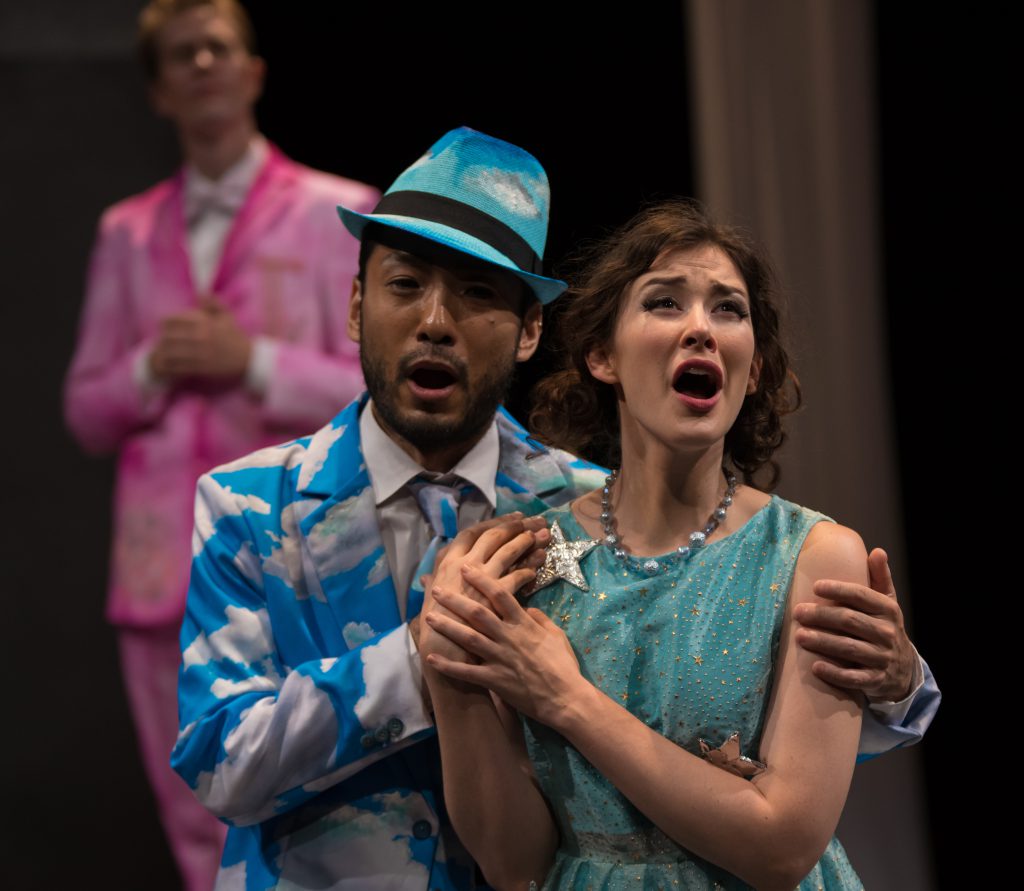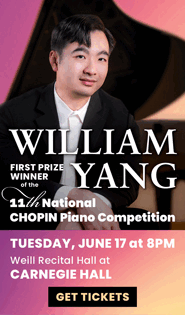Dell’Arte Opera serves up a racy and exuberant “La Calisto”

Nobuki Momma as Jove and Marie Marquis in the title role of Cavalli’s “La Calisto” at Dell’Arte Opera.
The god Jove’s job description surely includes something besides donning disguises and wooing earthly maidens, but you’d never know it from going to the opera. Over the centuries, the king of the gods’ amorous adventures have kept many an opera house humming.
An early example of the operatic complications a god’s wandering eye can cause is Francesco Cavalli’s 1651 charmer La Calisto, which glittered anew Saturday night in a lively and engaging performance by Dell’Arte Opera Ensemble.
The developmental company’s cast of young singers, supported by a superb period-instrument ensemble led by lutenist Charles Weaver, artfully mingled comedy and tender sentiment as the opera’s nearly three-hour duration seemed to fly by.
Indeed, three hours barely seemed enough time to weave and untangle the tale of the wood nymph and archer Callisto—follower of the goddess Diana, object of Jove’s lust, turned into a bear by Jove’s jealous wife Juno, and eventually installed in the heavens as, what else, the constellation Ursa Major—and the various amorous schemes and frustrations of a supporting cast of gods, nymphs, satyrs and a poet, and then to sing about it.
Happily, in the intimate black-box space of La MaMa on East 4th Street, the singer-actors could deliver naturally phrased recitative shading into arioso—Cavalli’s fluidity in this regard has been compared to Wagner’s—without severe vocal effort. The virtuosity was less in high notes than in the exuberant roulades on one syllable that blossomed at moments of high emotion, an ancient and mostly lost art that at least some of Saturday’s cast seemed to have rediscovered.
As Callisto, soprano Marie Marquis projected the young archer’s innocence with a touch of fluttery vibrato and graceful movement onstage. Portraying a character more acted upon than acting, Marquis sensitively expressed the turbulent emotions of a girl who became the plaything of the gods.
As Jove and his crafty enabler Mercury, baritone Nobuki Momma and tenor Timothy Stoddard used their height difference to comic effect, the former a compact but strutting boss in sky-blue suit and fedora, the latter a lanky, rubber-limbed, hyperactive schemer in a flaming orange-and-pink suit.
Momma cannily underplayed and undersung his role, as if his character and everybody else knew the world revolved around him, so why throw his weight around? In contrast, Stoddard exploited his fine, strong voice and physical gifts to the fullest in an over-the-top performance—really, cartwheels during an aria?—that seemed rather garish amid the nuanced comedy of this production. But then, if Mercury can’t be mercurial, who can? (The cartwheels were about a 9.3.)
Soprano Alison Taylor Cheeseman mined comic gold in the dual role of the goddess Diana and Jove disguised as Diana for the purpose of making love to Callisto. (I am not making this up.) The dignified goddess struggled girlishly with her vow of chastity when it came to the handsome poet Endymion. (Vows of chastity seemed to tumble left and right in the racy libretto by Giovanni Faustini, and I’m not making his name up either.) When the singer added a touch of masculine swagger, all of a sudden there was the king of the gods plotting his latest conquest. Cheeseman delivered it all with firm voice and striking presence.
Jeffrey Mandelbaum portrayed the poet in a full-bodied countertenor that, combined with his trim physique and flowing hair, gave the role plenty of masculine sex appeal. (Which is why some invented business of Jove and Mercury snickering over a book of his poems seemed to miss the mark.)
A poet lying down in moonlight and dreaming of being united in love with his favorite goddess was the generative image for this entire dramma per musica. The anything-goes dream atmosphere affected even Diana’s martinet lieutenant, the archer Linfea, who did a 180 at midstory, chucking the chastity thing and vowing to get a man in her life. In this secondary role, soprano Taylor Kirk was not just an effective actress but the vocal standout of the night, with an uncommonly well-supported and clear tone capable of many colors.
As Satirino, literally the “little satyr” who overhears Linfea’s appeal for a man and decides he’s just the guy for the job, a furry-costumed Victoria Rodriguez sang well and capered amusingly with a mixture of human male and monkey mannerisms.
The god Pan, enamored of Diana, was depicted Saturday as a goat-footed, bespectacled nerd seething with rage at the goddess’s rejection, with Padraic Costello singing the role energetically in a high-tenor mix of chest voice and falsetto. With his attendant Silvano—the hulking, foggy-voiced bass Will Esch—Pan succeeded in kidnapping his rival Endymion, only to be forced to turn him loose by the goddess herself.
At last, Juno, wife of Jove, arrived on the scene, resplendent in a wedding-cake gown and magenta headdress. Sizing up the situation in a flash, she gave her errant husband a tongue-lashing, laid the bear curse on poor, unoffending Callisto, and ordered the other characters to get their acts together. In this déesse-ex-machina role, Allison Gish’s soprano was a trumpet of indignation.
Kirsti Esch, Rebecca Richardson, and Sophia Mortensen showed vocal versatility as dignified allegorical figures in the prologue and Juno’s shrieking, cackling Furies in later scenes.
The action closed with a series of arias for the main characters, a counterpoint of happily-ever-after for the lovers and Juno’s weary reflections on man’s inhumanity to woman. All the singers seemed to relish these long-awaited set pieces, and sustained them well.
In an epilogue, Callisto’s apotheosis took place on a high platform at the distant rear of the stage, a new constellation amid shiny spheres, while the entire cast sang her praises.
Except for this last tableau, all the action took place in You-Shin Chen’s simple, gray-toned setting, consisting of a ramp in three sections that was rearranged (with some difficulty) by the cast between scenes, and a half-dozen lengths of white fabric that could be hung like pillars, draped to form a bower, or left in cloud-like heaps for the gods to stroll among.
In contrast to the plain setting, Claire Townsend’s costumes were all color and fantasy. Callisto and her fellow archers wore a pastoral blouse-and-skirt combination suggestive of shepherdesses and school uniforms, with added ribbons and furbelows. Incongruity was part of the fun, as in Diana’s combination of moon-colored tank dress, antler headdress, and dark brown ankle boots.
Brittany Goodwin’s stage direction was an effective mix of unfussy blocking for the principal characters and occasional bursts of chaotic to-and-fro in the semi-darkness upstage. She added visual appeal by sometimes dressing the simple set with Diana’s followers in statue-like archery poses. And let us not underestimate the role of visual appeal in helping an opera across the slow places, of which this production had blessedly few.
La Calisto will be repeated with the same cast 2 p.m. Saturday and 7:30 p.m. August 26 at La MaMa, 66 E. 4th St. A second cast will perform 2 p.m. August 20 and 7:30 p.m. August 24. dellarteopera.org; 646-632-2340.

